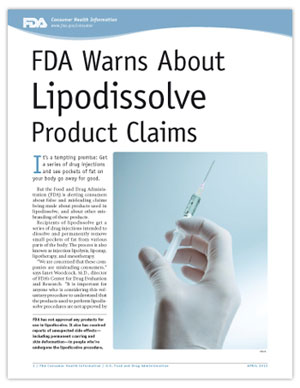FDA Warns About Lipodissolve Product Claims
On this page:
It's a tempting premise: Get a series of drug injections and see pockets of fat on your body go away for good.
But the Food and Drug Administration (FDA) is alerting consumers about false and misleading claims being made about products used in lipodissolve, and about other misbranding of these products.
Recipients of lipodissolve get a series of drug injections intended to dissolve and permanently remove small pockets of fat from various parts of the body. The process is also known as injection lipolysis, lipozap, lipotherapy, and mesotherapy.
“We are concerned that these companies are misleading consumers,” says Janet Woodcock, M.D., director of FDA’s Center for Drug Evaluation and Research. “It is important for anyone who is considering this voluntary procedure to understand that the products used to perform lipodissolve procedures are not approved by FDA for fat removal.”
The drugs most regularly used in the lipodissolve injection regimen are phosphatidylcholine and deoxycholate (commonly called PC and DC, respectively). Other ingredients may also be used, including drugs or components of other products such as vitamins, minerals, and herbal extracts.
What Consumers Should Know
FDA is alerting consumers that
- it has not evaluated or approved products for use in lipodissolve
- it is not aware of evidence supporting the effectiveness of the substances used in lipodissolve for fat elimination
- the safety of these substances, when used alone or in combination, is unknown
- it is not aware of clinical studies to support medical uses of lipodissolve
In addition, FDA has reports of unexpected side effects in people who’ve undergone the lipodissolve procedure. These side effects include
- permanent scarring
- skin deformation
- deep, painful knots under the skin in areas where the lipodissolve treatments were injected
FDA Actions
On April 7, 2010, FDA announced it had sent warning letters to six medical spas in the United States—and a cyber letter to a company in Brazil—for making false or misleading statements on their Web sites about drugs used in the procedure, or for otherwise misbranding lipodissolve products. (Cyber letters are letters sent to companies whose U.S. online sales of products may be illegal.)
The U.S. medical spas receiving warning letters make various unsupported claims about lipodissolve, such as assertions that the products used in lipodissolve
- are safe and effective
- have an outstanding safety record
- are superior to other fat-loss procedures, including liposuction
Additionally some of the letters indicate that the companies have made claims that lipodissolve can be used to treat certain medical conditions, such as male breast enlargement, benign fatty growths known as lipomas, excess fat deposits and surgical deformities.
The U.S. companies receiving warning letters in regard to lipodissolve products are
- Monarch Med Spa, King of Prussia, Pa.
- Spa 35, Boise, Idaho
- Medical Cosmetic Enhancements, Chevy Chase, Md.
- Innovative Directions in Health, Edina, Minn.
- PURE Med Spa, Boca Raton, Fla.
- All About You Med Spa, Madison, Ind.
FDA is requesting a written response from these U.S. companies within 15 business days of receipt of the letters stating how they will correct these violations and prevent similar violations in the future. These firms were told that failure to promptly correct the violations may result in legal action.
The Brazilian firm getting a warning letter markets lipodissolve products on two Web sites: zipmed.net and mesoone.com. FDA will notify regulatory authorities in Brazil of this action. The agency has issued an import alert against the zipmed.net and mesoone.com entities to prevent the importation and distribution of unapproved lipodissolve drug products into the United States. Importing and distributing unapproved drug products is a violation of the Federal Food, Drug, and Cosmetic Act.
How to Report Side Effects
Consumers and health care professionals may report serious side effects with the use of lipodissolve products to FDA’s MedWatch Adverse Event Reporting Program either online, by regular mail, by fax, or by phone.
- online: www.accessdata.fda.gov/scripts/medwatch/
- by regular mail: Use postage-paid, pre-addressed FDA form 3500
- by Fax: (800) FDA-0178
- by phone: (800) FDA-1088
This article appears on FDA's Consumer Updates page, which features the latest on all FDA-regulated products.
Date Posted: April 7, 2010
Return to FDA Consumer Articles

